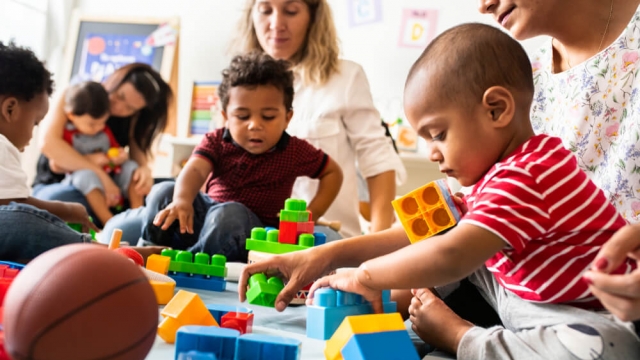The emergency child care funding allocated by Congress during the pandemic is set to expire on Sept. 30.
An estimated 220,000 child care programs benefited from the $24 billion in funding, according to the Department of Health and Human Services.
But now, an estimated 70,000 programs are projected to close, causing 3.2 million children to lose care, according to a new study by the Century Foundation.
That study says this could also result in tuition hikes or layoffs at childcare centers, potentially worsening the child care shortage and providing access to affordable child care for many families.
Additionally, it reports that this will also result in a loss of tax and business revenue, potentially costing states more than $10 billion a year.
And while Democrats and some Republicans do want subsidies to be extended or made permanent, their ideas on how much to spend and how to fund them drastically differ.
In the meantime, many families will be stuck with limited options and paying an average of nearly $12,000 a year for child care, which research suggests is the largest financial burden of raising a child.
A recent Lending Tree survey found that between 2016 and 2021, the cost of raising a child rose nearly 20%. That includes the costs of food, clothes, transportation, and child care.
Meanwhile, the Census Bureau announced earlier this week that the median family income dropped for the third straight year.
These shifts are happening while more women in the country are facing restrictions on their reproductive choices.
SEE MORE: What does it cost to raise a child? Study shows prices have climbed
Lauren Hipp, the National Director of Early Learning and Washington State for MomsRising, tells Scripps News that this issue represents a pressing economic concern for the nation, one with the potential to exacerbate if not adequately addressed.
"This is a huge impact for families and their ability to budget and be able to make ends meet. We need to be investing in child care; we need to treat child care as the public good that it is," said Hipp. "Child care is a public good, and it has been a policy choice not to put the resources into the field that is necessary to bring families out of this crisis, to bring providers out of this crisis, and to allow them the freedom to live in prosperity."
Congressional Democrats are advocating for a $16 billion annual funding for five years to sustain the child care sector, aiming to prevent closures due to the expiration of previous relief. However, the bill faces resistance from Republicans, posing a challenge in Congress.
"This is a nonpartisan issue. Child care should mean something to every person in this country, whether you have a young child in care or not," said Hipp. "We know that there are many indications that would suggest that this would be a critical policy to pass, not only because of the immediate economic impacts and the long-term economic impacts for families and for our overall economy. We know businesses depend on families having access to child care, this indicates that this would be a massively important issue to constituents."
Hipp says that 3.2 million children losing access to child care is a serious matter, and parents can't afford to wait and don't want to see any "political tricks or games."
"Politicians and lawmakers in D.C. need to be taking this seriously and need to be treating this with the seriousness that it deserves. This is a crisis at hand. They have the solution in front of them with the data that they need. The time to act is now," said Hipp.
Trending stories at Scrippsnews.com



